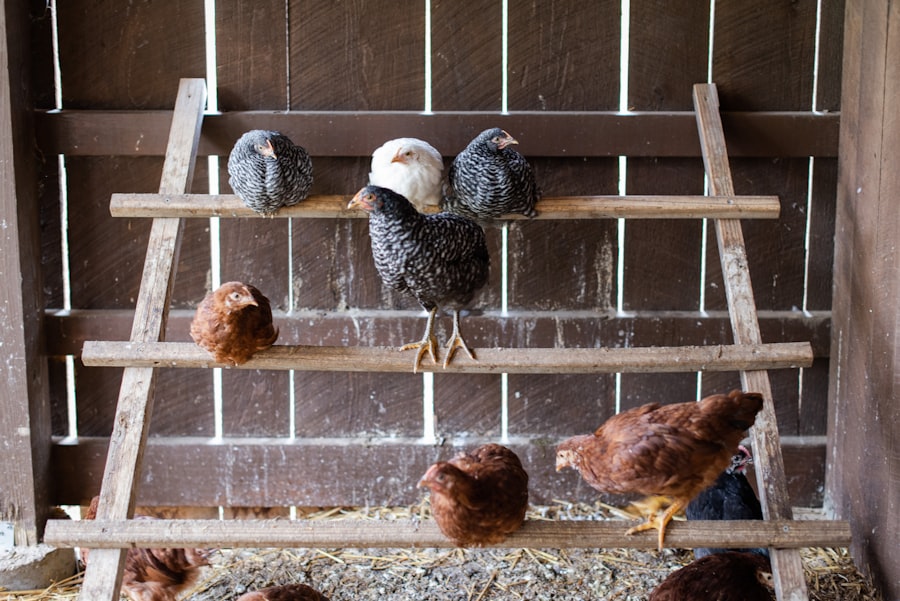Keeping chickens safe from predators is crucial for their well-being and survival. Predators can include raccoons, foxes, coyotes, and even domestic dogs and cats. These predators are not only a threat to the chickens themselves but can also cause stress and anxiety for the birds. A secure chicken coop can prevent these predators from accessing your chickens, ensuring their safety and allowing them to live a happy and healthy life.
Key Takeaways
- Predator-proofing your chicken coop is crucial to keeping your chickens safe from harm.
- Common predators include raccoons, foxes, coyotes, and birds of prey.
- Building a secure chicken coop involves using sturdy materials, secure locks, and proper ventilation.
- Choosing the right location for your chicken coop means avoiding areas with heavy vegetation or easy access for predators.
- Installing fencing, motion-activated lights and alarms, and using natural deterrents can all help keep predators away.
Understanding the types of predators that threaten your chickens
Different predators have different methods of attack. Raccoons and foxes, for example, are known for their ability to dig under or climb over fences. They are also skilled at opening latches and doors. Coyotes, on the other hand, are known for their jumping ability and can easily clear a fence that is not tall enough. Domestic pets can also pose a threat if they are not properly trained or supervised. It is important to understand the behavior and capabilities of these predators in order to effectively predator-proof your chicken coop.
Tips for building a secure chicken coop
When building a chicken coop, it is important to use sturdy materials that can withstand the strength and persistence of predators. Hardware cloth or welded wire mesh is recommended for covering openings such as windows and vents. These materials are strong enough to prevent predators from gaining access to the coop. It is also important to install a strong door with a secure latch that cannot be easily opened by predators. Additionally, consider adding a predator-proof apron around the perimeter of the coop. This is a wire mesh that extends outward from the base of the coop, preventing predators from digging under the fence.
Choosing the right location for your chicken coop
The location of your chicken coop plays a crucial role in protecting your chickens from predators. Avoid placing the coop near areas where predators may be present, such as wooded areas or fields. These areas provide cover for predators and make it easier for them to approach the coop undetected. Instead, choose a location that is well-lit and visible from your home. This will make it easier for you to monitor the coop and deter predators. Additionally, consider the terrain and make sure the coop is on level ground. This will prevent predators from being able to dig under the coop.
Installing fencing to keep predators out
Fencing is an important component of predator-proofing your chicken coop. It acts as a physical barrier that prevents predators from gaining access to your chickens. When installing fencing, it is important to use a fence that is at least 6 feet tall and buried at least 1 foot deep. This will prevent predators from being able to climb over or dig under the fence. It is also important to make sure the fence is sturdy and cannot be easily damaged or knocked down by predators. Additionally, consider adding an electric fence for added security. This can provide an additional deterrent for predators and prevent them from attempting to breach the fence.
Using motion-activated lights and alarms to deter predators

Motion-activated lights can be an effective deterrent for predators. When a predator approaches the coop, the lights will turn on, startling the predator and making them think twice about approaching further. Alarms can also be effective in scaring off predators. These alarms can be set to go off when a predator enters a certain area, alerting you to their presence and scaring them away. Both motion-activated lights and alarms can be easily installed and provide an extra layer of security for your chickens.
Creating a predator-proof run for your chickens
A run is an enclosed area where chickens can safely roam outside of the coop. It provides them with additional space to exercise and explore while still keeping them protected from predators. When creating a predator-proof run, it is important to use the same materials and techniques as the coop. This includes using sturdy materials such as hardware cloth or welded wire mesh and ensuring that all openings are securely covered. Additionally, consider adding a roof to the run to prevent aerial predators such as hawks and owls from swooping down and attacking your chickens.
Implementing safe feeding practices to avoid attracting predators
Feeding your chickens in a safe and secure manner is essential for preventing predators from being attracted to your coop. Do not leave food out overnight, as this can attract predators. Instead, feed your chickens during the day and remove any uneaten food before nightfall. Use a secure feeder that cannot be easily tipped over or accessed by predators. This will prevent them from being able to steal or consume the chicken feed. Additionally, store feed in a secure container that is not easily accessible to predators.
Using natural deterrents to keep predators away
There are several natural deterrents that can be used to keep predators away from your chicken coop. Planting certain herbs and flowers can help repel predators. For example, marigolds and lavender are known to repel pests such as raccoons and foxes. Additionally, using predator urine or other natural deterrents can be effective in keeping predators away. These deterrents mimic the scent of predators and can deter other animals from approaching the coop.
Regularly inspecting and maintaining your chicken coop to ensure its security
Regularly inspecting and maintaining your chicken coop is essential for ensuring its security. Check for any holes or gaps in the fencing or coop that could provide an entry point for predators. Make sure all latches and locks are secure and functioning properly. Remove any debris or clutter around the coop that could provide cover for predators. By regularly inspecting and maintaining your chicken coop, you can identify and address any potential vulnerabilities before they become a problem.
Predator-proofing your chicken coop is essential for the safety and well-being of your chickens. By following these tips, you can create a secure and safe environment for your feathered friends. Remember to use sturdy materials, secure all openings, choose the right location, install fencing, use motion-activated lights and alarms, create a predator-proof run, implement safe feeding practices, use natural deterrents, and regularly inspect and maintain your coop. By taking these steps, you can protect your chickens from predators and provide them with a safe and happy home.
If you’re looking for tips on how to keep predators away from your chickens, you’ll definitely want to check out this informative article on the Poultry Wizard website. They provide valuable insights and practical advice on protecting your feathered friends from potential threats. From securing the chicken coop with sturdy fencing to using motion-activated lights and sound devices, this article covers various strategies to deter predators effectively. To learn more, click here: https://poultrywizard.com/keeping-chickens/the-chicken-coop-country-diner/.
FAQs
What are the common predators of chickens?
Common predators of chickens include foxes, raccoons, coyotes, snakes, hawks, owls, and domestic dogs and cats.
How can I secure my chicken coop?
You can secure your chicken coop by using sturdy materials such as hardware cloth or welded wire mesh, burying the wire at least 12 inches deep, and ensuring that all openings are covered with wire mesh. You can also install locks on doors and windows to prevent predators from entering.
What can I do to deter predators from my chicken coop?
You can deter predators from your chicken coop by using motion-activated lights and sound devices, keeping the area around the coop free of tall grass and brush, and using natural deterrents such as predator urine or human hair.
How can I protect my chickens when they are free-ranging?
You can protect your chickens when they are free-ranging by supervising them, providing them with a secure area to retreat to, and using portable electric fencing to create a perimeter around them.
What should I do if a predator attacks my chickens?
If a predator attacks your chickens, you should immediately remove any injured or dead birds from the coop and secure the remaining birds. You should also identify the type of predator and take steps to prevent future attacks. If necessary, you may need to contact a wildlife control professional.
Meet Walter, the feathered-friend fanatic of Florida! Nestled in the sunshine state, Walter struts through life with his feathered companions, clucking his way to happiness. With a coop that’s fancier than a five-star hotel, he’s the Don Juan of the chicken world. When he’s not teaching his hens to do the cha-cha, you’ll find him in a heated debate with his prized rooster, Sir Clucks-a-Lot. Walter’s poultry passion is no yolk; he’s the sunny-side-up guy you never knew you needed in your flock of friends!







